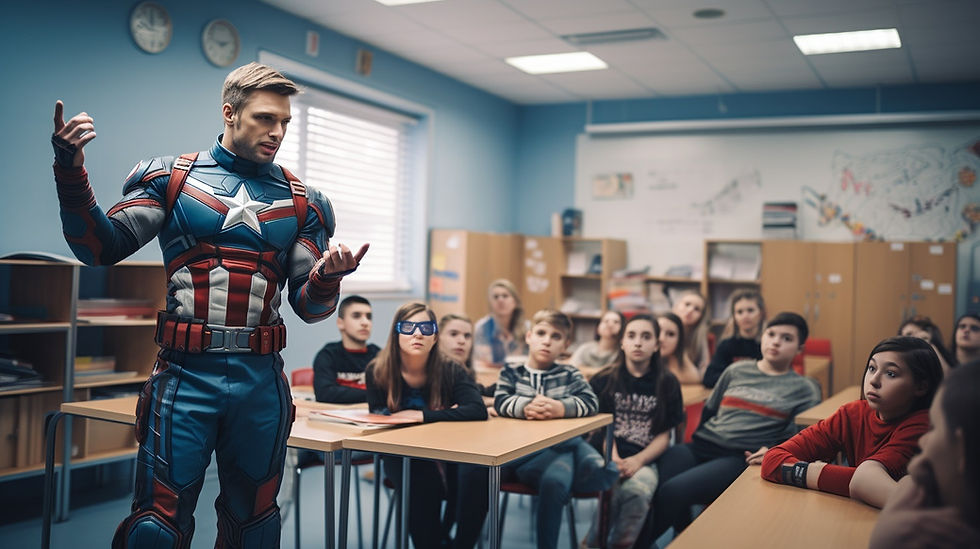The Power of Play: Using AI to Enhance Learning for Kids
- Bot Bot

- Apr 15, 2023
- 3 min read
Updated: Apr 20, 2023
How ChatGPT can Enhance Children's Learning Experience
Play-based learning is a fun and effective approach to education that can help children develop their cognitive, social, emotional, physical, and creative skills. By integrating AI tools like OpenAI's ChatGPT, we can enhance the learning experience for kids and provide personalized and engaging lessons.

As parents and educators, we often prioritize academic achievement and overlook the importance of play in children's learning processes. Play, however, is not just a frivolous activity. It is a crucial component of a child's cognitive, emotional, and social development. Research shows that play-based learning can improve children's academic performance, creativity, problem-solving skills, and emotional well-being.
With the advancement of technology, we can now enhance the learning experience of children through the use of Artificial Intelligence (AI) tools such as OpenAI's ChatGPT.

The Significance of Play in Children's Learning Processes
Play is a natural way of learning for children. It is through play that children explore their environment, develop their cognitive and social skills, and make sense of the world around them.
Play can take various forms, such as pretend play, physical play, construction play, and creative play. Each type of play offers unique opportunities for learning and development.
The Benefits of Play-Based Learning
Play-based learning has been shown to have numerous benefits for children's academic, social, emotional, and physical development. Here are some of the main benefits of play-based learning:
Improves Academic Performance
Play-based learning can improve children's academic performance by promoting critical thinking, problem-solving, and creativity. Research shows that children who engage in play-based learning are more motivated to learn and have higher academic achievement in subjects such as math, science, and language.

Develops Social Skills
Play-based learning provides opportunities for children to interact with others, practice social skills, and develop empathy and emotional intelligence. Through play, children learn to negotiate, cooperate, share, and resolve conflicts, which are essential skills for success in school and later in life.
Boosts Emotional Well-being
Play-based learning can also have a positive impact on children's emotional well-being. Through play, children learn to express their emotions, develop coping skills, and build resilience. Play can also help children to reduce stress and anxiety and promote positive mental health.
Enhances Physical Development
Play-based learning promotes physical development by providing opportunities for children to engage in physical activities that promote gross and fine motor skills, such as running, jumping, and manipulating objects.
Fosters Creativity
Play-based learning fosters creativity by providing opportunities for children to engage in imaginative and creative activities, such as art, music, and storytelling. Creativity is an essential skill for success in the 21st century, as it allows children to think outside the box and come up with innovative solutions to problems.

How ChatGPT can Enhance Children's Learning Experience
With the advancement of technology, we can now enhance the learning experience of children through the use of AI tools such as OpenAI's ChatGPT. ChatGPT is a natural language processing model that can generate human-like responses to written prompts. It has the potential to transform the way children learn by providing personalized and engaging learning experiences.
Here are some ways in which ChatGPT can enhance children's learning experience:
Personalized Learning
ChatGPT can provide personalized learning experiences by generating responses that are tailored to the individual needs and abilities of each child. For example, ChatGPT can adapt to the level of the child's understanding and provide feedback and guidance that is specific to their learning style.
Interactive Learning
ChatGPT can also provide interactive learning experiences by engaging children in conversations and simulations. For example, ChatGPT can simulate real-life scenarios and provide opportunities for children to practice problem-solving and decision-making skills in a safe and supportive environment.

Engaging Learning
ChatGPT can make learning more engaging by providing feedback and encouragement that is personalized and relevant to the child's interests and abilities. For example, ChatGPT can provide positive reinforcement and incentives that motivate children to learn and explore new topics.
Flexible Learning
ChatGPT can provide flexible learning experiences by adapting to the child's schedule and preferences. For example, ChatGPT can provide learning activities that are accessible through different devices and platforms, such as smartphones and tablets, and can be completed at any time and place.

Play-based learning is a valuable and effective approach to education that promotes children's learning and development across multiple domains. With the integration of AI tools such as OpenAI's ChatGPT, we can enhance the learning experience of children and provide personalized and engaging learning experiences that foster their cognitive, social, emotional, physical, and creative development.
To promote play-based learning and incorporate ChatGPT in educational settings, governments should prioritise the promotion of play-based learning in early childhood education, provide training and professional development for educators, ensure access and equity, foster collaboration and partnership, and monitor and evaluate the impact of play-based learning and ChatGPT.
With Love, Bot bot.




Comments